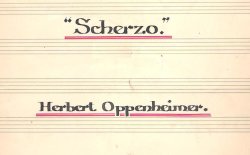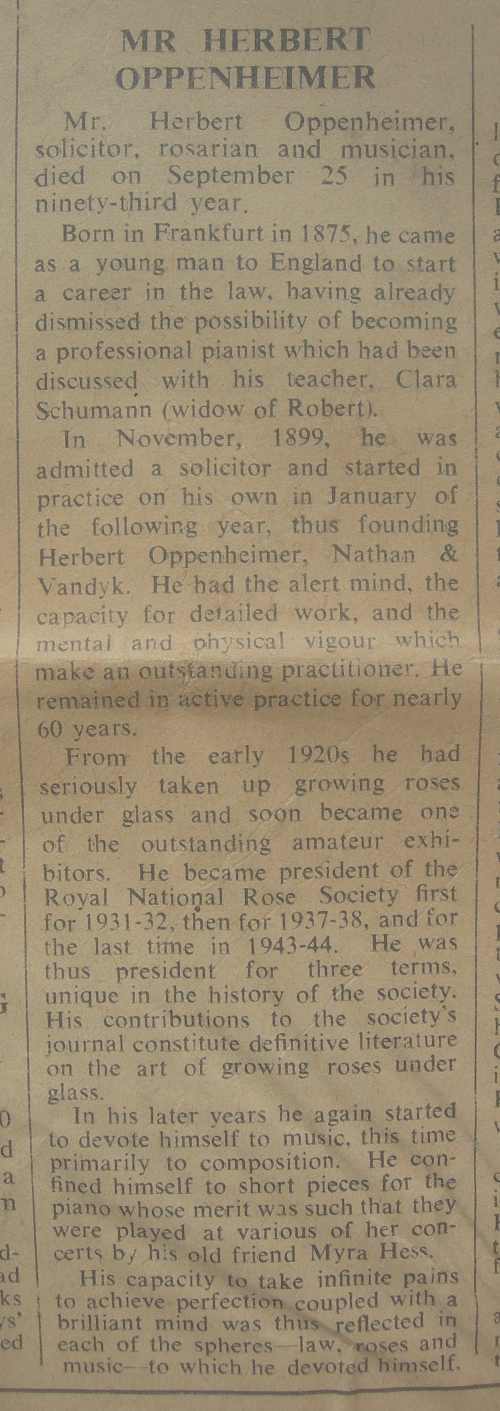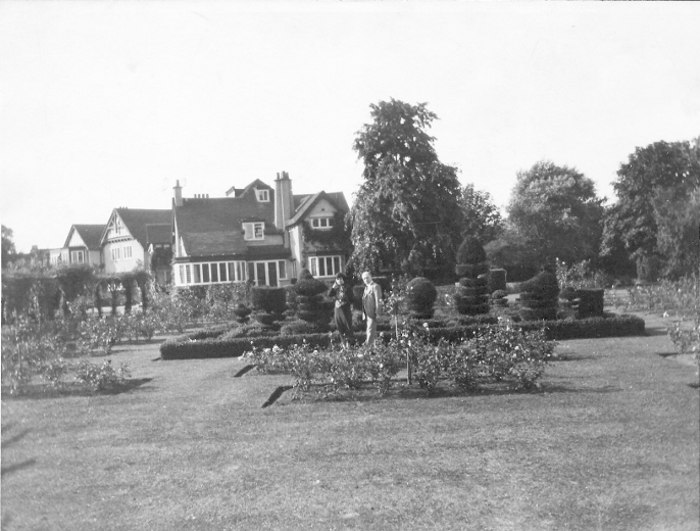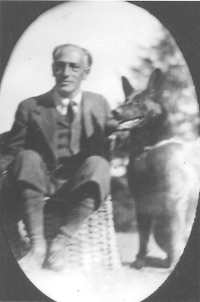
Herbert Oppenheimer Piano Music
HERBERT OPPENHEIMER (1875-1968)
In 1985 or thereabouts I was searching for piano music in a secondhand bookshop in Newent and came across a small pile of manuscripts, all for piano solo. The signature "Herbert Oppenheimer" on the title pages was distinguished and confident, and the musical writing was clear, ambitious and technically accomplished; one could see at a glance that it was the work of a successful man, and a pianist of some ability. I gathered up what was left of them, (for some had clearly been sold) paid about ten pounds, and after a quick play-through later that week, thought no more about them until a few years later when I was leafing through a copy of "The Rose Annual" for 1969 looking for an article on climbing roses. What I found caused me to have a closer look at the music...
Herbert Oppenheimer, D.H.M.
"On several occasions when I have visited Herbert Oppenheimer at
his home at Maidenhead when his large greenhouses, containing a
collection of roses, were in full bloom. I have never seen a finer
collection by an amateur and his exhibitions at the Spring Shows,
alas no longer held, were always most noteworthy. He died on 25th
September 1968 in his ninety-third year.
He was a great supporter of the late Courtney Page, who was Secretary of the Society for many years, and on on occasion, I remember, when the Council was criticising Page, he came back specially from Switzerland during his holidays, to take the chair as President.
Oppenheimer was born in Frankfort in 1875 and joined the Society in 1912; he was elected to the Council in 1921 and became President in 1931-2. He was President on two other occasions, in 1937-8 and in 1943-4, unique in the history of the Society.
He started in practice in 1899 when he founded the firm of Herbert Oppenheimer, Nathan and Vandyck and remained in practice about 60 years. (The firm was in existence until 1988; it was a large legal practice-ND ) Apart from his profession and his roses he was also a musician of distinction - indeed, in his youth there was talk of him becoming a professional pianist, but fortunately for us this was decided against and he came to England to become a solicitor. During his later years he devoted more time to his music and wrote a number of short pieces for the piano, which were highly regarded and played by Myra Hess at her concerts."
Bertram Park...Rose Annual, 1969
I would be very interested to hear from anyone who has piano music by Herbert Oppenheimer, or anyone who heard him play. Please send me an email.
HERBERT OPPENHEIMER: the music I have:
Scherzo I, manuscript, Eb
Scherzo II, manuscript, A
Valse, Dm, manuscript
Valse, Am, privately printed
Mazurka, G, privately printed
Six Mazurkas (single volume, commercial quality imprint from "Herbert Oppenheimer, Weir Bank, Bray, Berkshire"):Am, F, Gm, Am, A, C
I will write my impressions of the music after playing it again. There are some similarities with Burrows.
- FURTHER UPDATE.......I'm practising some of it with a view to doing some recordings. I'm working on the Scherzos, the Valses and the separately - printed Mazurka.
I have also found an online reference to a piece written by Oppenheimer published by Joseph Willams in 1950, entitled 'Storm Predule'; 7 pages. Anyone have a copy? I will supply a copy of his first Scherzo in exchange.
OPPENHEIMER'S MUSIC - SOME IMPRESSIONS
It seems that Oppenheimer was a Chopin enthusiast; his pieces all have Chopinesque titles, and one can sometimes hear faint echoes of the romatic era in the music. Most of the pieces last about five minutes, and are well structured, the sections being well-defined and nicely finished off; he was careful about detail and had a gift for melody. One can see why they were used by Myra Hess in her recitals.
His pieces show a fondness for the 'neopolitan' chord, which crops up in many of the pieces. The style is quite florid and needs a good technique and nimble fingers, but there's nothing 'atonal' or 'advanced' about the harmonies; nothing like the virtuostic late Burrows studies or the Burrows sonata. They are closer in style to the Lyric pieces, and around three times the length.
Click on the thumbnail below for a sample of the manuscript of his scherzo no. 1, and on Scherzo 1 / Valse 1 for the recordings I did in July-Aug 2012.

............I also have an interesting article about rose growing by Oppenheimer dating from 1933, entitled 'Doing Things in Time'.
Judging by the excellence Oppenheimer showed in three fields (founding a well-known legal firm, writing piano music, and becoming three times President of the National Rose Society) , doing things in time was a rule he followed.
UPDATE, 2018
In June 2018 I was surprised to be contacted as follows:
I have found the reference to the music of Herbert Oppenheimer on your website and as far as I understand you have created a CD with two of his pieces, "Scherzo" and "Valse."
My late husband's mother, Joy Wyld, born Oppenheimer, spent a lot of time at Weir Bank as a child and young adult and was a talented pianist. She was Herbert's niece, and she recounted that she and her uncle Herbert would play duets on the grand pianos in the reception rooms at the house. There is now no-one left in the family to confirm that Herbert had lessons with Clara Schumann in his youth; the family was German initially and came from Frankfurt.
Herbert came from a talented family - he was one of three brothers: Julius, J's father, was an art collector with an eye for Italian C20th painters, and Alfred was a businessman but also a member of the Magic Circle, the organization for professional magicians.
It was family history that Herbert, as a very impressive lawyer, contributed to the drafting of the reparation clauses in the Versailles treaty (but then some would say these clauses were so harsh as to contribute to WW2.)
I have beside me a photograph dating from about 1877 showing Herbert aged 2 or 3 years standing beside his baby brother Julius. Herbert is wearing a frilly dress with big buttons and a ruched front, and he has lace around his knees and boots on his feet. A very serious child.
I am enclosing a photograph of Herbert with his dog. Most of the photos are dated 1933 so that is probably the date. (Click the thumbnail for a bigger picture)
By the way, although Herbert lived at Weirbank near Maidenhead and grew roses (he had a gardener, Betteridge, who probably was entitled to some of the glory), when he needed to be in London he had a chauffeur and kept a suite of rooms at the Ritz.
EB.
(ND recording of Herbert's A-minor 'Valse' was played to the congregation at Joy Wyld's funeral in June 2018. - Ed.)
UPDATE, Oct 2018
In late 2018 I was contacted by Richard S, who wrote as follows:
I hope this is the correct email address for information on Herbert Oppenheimer. Perhaps the following will be of interest to you.
As a child my mother lived in one of the cottages on Monkey Island.
She is now in her 80s and was very young at the time just before WW2. Her father was the chauffeur referred to on your website.
She remembers the dog in the photo of Herbert Oppenheimer but cannot remember its name.
She also recalls a time when her Dad took Oppenheimer to London (presumably to the Ritz) and picked someone up for a fare on the way back. Someone saw him and reported him. Oppenheimer was not happy and said if it happened again my grandfather’s chauffeur job would be gone.
When war broke out my grandfather joined the fire brigade and worked all over the country including London putting out fires from the bombing. Oppenheimer said the family could stay in the cottage, but the new chauffeur would have to stay there too. My grandparents were not happy with this, so they left.
My mother still has several photos of her and sister with their parents at Weir Bank in the swimming pool etc. She also remembers Stirling Moss who lived nearby.
RS
Later update located Dec 2018: Daily Telegraph obituary, DT page 12, Oct 1st 1968


Weir Bank, 1933, showing part of the rose gardens. Figures in the picture (pencilled on reverse of photo):
Julius Oppenheimer and Emilia. Sent by Libby B.
***************************************
Message received 1 Feb 2019, from Paul M:
When searching for Herbert Oppenheimer, I found this article:
Saturday, February 26, 1938; THE DAILY MIRROR
YOUNG PILOT JUMPED 1,000ft — HE COULDN'T STOP
"To airmen—no landing," said notices in a
field at Bray. Berks. But Pilot-Pupil
Mulloy, of Maidenhead flying School, had no
choice as he came sailing down by parachute.
A thousand feet overhead one of the wings
had broken from his 'plane, and Mulloy didn't
stop to look—he jumped. He was unscathed
except for a cut eye and a lost shoe.
His 'plane crashed on the lawn of the
Thames-side residence of Mr. H. Oppenheimer,
Weir Bank, Bray, twenty yards from the river,
and burst into flames. The aircraft was DH82A Tiger Moth Registration G-ACDH of 13 ERFTS at White Waltham piloted by Mr William Arthur Coote Mulloy; killed RAF WW2.
It was good to see a picture of where Mulloy landed from the period – I don’t know if Oppenheimer was in residence at the time.
P.M.
**************************
STORM PRELUDE
I now have a printed copy of this piece, supplied by E (Libby) Bower (many thanks) and have recorded it. The piece can be heard here: Storm Prelude . It's also in my piano collection 2018a, on Youtube.
N.D, 2 Feb 2019
**************************
Message received 24 Jul 2023, from Deborah Kaplinsky:
Herbert Oppenheimer memories
I was fascinated to see your information about Herbert Oppenheimer and his life.
My great Aunt Frances,(always known as Fanny) nee MacFarlane was married to Herbert. I knew him as Great Uncle Herbert when our family visited Wierbank when I was a child in the 1950's.
I remember the vast garden with its river frontage opposite Monkey Island. My sister and I were sent to play in the garden so that the grown ups could talk and once got into trouble for breaking off the asparagus spears and using them as diving bombs into a large rainwater tank.
We had lunch in the dining room at a large polished table.The piece de resistance of the meal was the fruit at the end, peaches, and grapes which had been grown in the greenhouse. I still remember Uncle Herbert's pride and him taking out his special penknife from his pocket to cut open the best looking peach to make sure it was perfect to serve to his guests and then cutting it into slices to put on our plates.. He told us he also used this knife to graft his roses when we were taken round his rose beds to appreciate his prizewinning blooms.
My impression was that he was a perfectionist in everything he did and somewhat terrifying for a child of my age (I was under 10). I do also remember his grand piano and him playing to us on it. I did not know that he had composed music himself and I have no idea if the music he played to us was his own composition.
By the time we made these visits to Weirbank, Herbert and my Great Aunt Fanny had been separated for many years. She was a far from elegant figure and played the piano enthusiastically but not very well, I'm afraid. Herbert, when we visited, was living (discreetly) with a lady companion called Annie Boalt (I'm not sure of the correct spelling) who had, I think, been trained as a ballet dancer and took an interest in me as I was keen on dancing.
My father, John Carswell, was the son of Catherine Carwell, Aunt Fanny's sister and I think that it was my father who initiated contact between our family and uncle Herbert after the war.
My parents John and Ianthe were in regular touch with Joy Wylde and I knew James when we were encouraged to go out together as young teenagers. But it never developed into a romance and we lost touch. I am sorry to hear that he has died and send my condolences. I do remember learning to ride a bicycle, which belonged to James on the gravel drive of Wierbank, and scraping my knee quite badly as I hadn't ever used a boys bike before and was wobbly anyway because it was too big.
I have pictures of my great Aunt if you would be interested but I am not sure if I have any of uncle Herbert.
With best wishes
Deborah Kaplinsky (nee Carswell).
**************************
Weir Bank update, 29 Jul 2023:
The main house at Weir Bank was developed by Sir Hugo Cunliffe-Owen in the early 20th century. Sir Hugo was a keen horse owner and breeder, and owned the 1928 Espom Derby winner “Felstead”. Weir Bank was bought by Herbert Oppenheimer, a London Solicitor (d. 1968), who moved there from Caterham in Kent during 1930. A passionate rose-grower, Herbert was three-times President of the National Rose Society and a pianist of distinction. The main house at Weir Bank was destroyed by fire in the early 1970s. The Estate was subsequently purchased privately and is the location of a family-run business.
**************************
NEWSPAPER SNIPPET FROM AMERICA
....From the Sarasota Herald newspaper, 10 Jun 1938: Herbert Oppenheimer, a wealthy solicitor of Bray, England, who grows roses as a hobby, won the Amateur championship of the Royal Horticultural Show in Westminster.
N.D. / Diversity Website
Footnote....I was pleasantly surprised to see 300 visits to this page during June 2012. I wonder what triggered this level of interest..... please contact me if you are interested in scores, or if you have further information about Oppenheimer.
